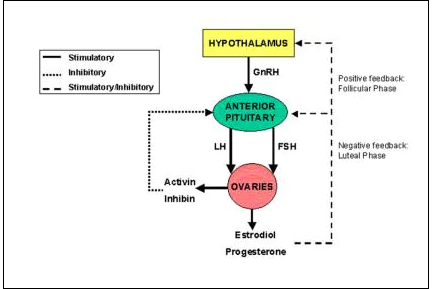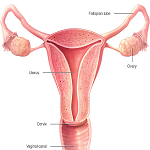Post-pill Amenorrhea
(Loss of Periods after Birth Control Pills)
Written by Dr.M.D.Mazumdar, MD
Post pill amenorrhea is described as the loss of menstrual periods for at least 6 months after stopping birth control pills. The incidence of post-pill amenorrhea ranges from 0.2% to 3%.

Birth Control Pills
Cause of Post-pill Amenorrhea
Post-pill amenorrhea is believed to be due to suppression of the pituitary gland by the birth control pills.
In a normal menstrual cycle, the pituitary gland produces hormones like Follicle Stimulating hormone (FSH) and Leutinizing Hormone(LH). These hormones stimulate the follicles in the ovary to develop.
The enlarging follicles produce estrogen as they grow and develop into maturity. Progesterone is produced after the follicle ruptures (called 'ovulation') at around the 14th day of the menstrual cycle. Estrogen and progesterone together cause the endometrium (inner uterine lining) to grow. A menstrual period is caused when this endometrium sheds at the end of the menstrual cycle.
All birth control pills contain the hormones, estrogen and progesterone.
When a woman takes these pills, the blood level of these hormones increases.
The high level sends a negative feedback to the pituitary gland indicating that there is sufficient estrogen and progesterone in the body. As a result the pituitary gland stops producing FSH and LH.
Ovulation does not occur without FSH and LH and pregnancy is prevented.
When a woman takes birth control pills for a sufficient length of time, the negative feedback to the pituitary gland may persist even after the pills are stopped.
This prevents ovulation and resumption of menstrual periods.
Sometimes post pill amenorrhea may be characterized by irregular and scanty periods rather than by complete stoppage of periods. But the cause is the same.
Women with a history of irregular periods are at higher risk of developing postpill amenorrhea. So, if a woman misses her period for longer than six months after discontinuing the pill, it is advisable to see a doctor to rule out any underlying medical medical issues.
[an error occurred while processing this directive]
Can pregnancy occur with postpill amenorrhea?
Since postpill amenorrhea is due to lack of ovulation, a pregnancy does not occur. But if ovulation occurs while women is still amenorrheic and sexual intercourse takes place before the periods can occur, then a pregnancy is possible.

How Amenorrhea is caused by BC Pills
Which women are more at risk?
Women with a history of irregular periods are at higher risk of developing postpill amenorrhea. So, if a woman misses her period for longer than six months after discontinuing the pill, it is advisable to see a doctor to rule out any underlying medical medical issues.
Some conditions are:
- Stress: Stress, especially acute mental stress, can suppress ovulation, disrupt the hormonal balance and cause missed periods.
- Weight changes: Rapid weight loss or gain can affect the body's hormonal balance and lead to missed periods. Many women who take up a exercise routine can suffer from amenorrhea.
- Medical conditions: Certain medical conditions, such as polycystic ovary syndrome (PCOS) or thyroid disorders, can also cause post-pill amenorrhea.
How long does post-pill amenorrhea last?
In most women , it lasts for about 3 months. Menstruation occurs spontaneously after this time. In some women it may last for 6 months. So, treatment is generally delayed for 6 months to allow the menstrual cycle to occur naturally.
Diagnosis of Post-pill Amenorrhea
The diagnosis of post-pill amenorrhea is usually made when there is loss of periods after a prolonged history of taking birth control pills. Causes of amenorrhea due to other causes need to be ruled out before diagnosing postpill amenorrhea.
- Lifestyle Causes : Causes like stress, excessive weight gain, sudden weight loss, excessive exercises or a strict diet change need to be ruled out as causes for the amenorrhea.
- Blood Tests : Conditions causing amenorrhea like pregnancy, Hypothyroidism, high prolactin levels and PCOS need to be rued out by blood tests for associated hormones. The serum levels of hormones like FSH, LH, estrogen and progesterone are also necessary.
- Ultrasonography : Ultrasonography will reveal ovaries with no signs of developing follicles and ovulation even after having stopped the pills for 6 months. It will also help rule out any causes like pregnancy, premature ovarian failure, PCOS and ovarian cysts and tumors.
- CT Scan : If the Prolactin level is high, then a CT scan may be necessary to rule out a pituitary tumor.
Blood tests showing a low level of FSH, LH and estrogen is usually sufficient to confirm the diagnosis.
Treatment of Post-pill Amenorrhea
The first line of treatment in case of post-pill amenorrhea is waiting for a spontaneous remission of the amenorrhea and a spontaneous occurance of periods.
The time limit is usually six months. But if the woman is anxious to get her periods, active treatment may be started after waiting for only three months.
- Stimulation of ovaries to Ovulate :
The standard treatment of post-pill amenorrhea is by stimulating the pituitary to produce FSH and LH. This is done by the drug clomiphene citrate.
Clomiphene citrate is a drug which can block the estrogen receptors in the uterus and other reproductive organs. This sends a signal to the pituitary that there is no estrogen in the body.
The pituitary then starts to produce more and more FSH to cause growth of follicles in the ovaries. The enlarging folllicles produce estrogen which stimulates the inner lining of the uterus (endometrium) to grow. Shedding of this endometrium causes menstruation or periods.
Clomiphene needs to be taken for 3 months for regular periods to resume.
Although, progesterone is often prescribed in postpill amenorrhea, it is not effective in stimulating the development of follicles in the ovaries. Without follicular growth, ovulation does not occur and without ovulation, it is difficult to get regular periods, although anovular periods can occur from time to time.
- Obesity: The patient must be encouraged to lose weight by a combination of diet, exercise and therapy if she is overweight.
- Stress :Stress can be controlled by stress management techniques such as meditation, yoga, therapy, or counselling.
- Hypothyroidism:If the cause of the amenorrhea is hypothyroidism, the thyroid hormone supplements will be the appropriate treatment.
- PCOS : PCOS will need to be treated by medicines like metformin and lifestyle changes like losing weight and diet improvement .
Can postpill amenorrhea be prevented?
Postpill amenorrhea is a common and normal side effect of the birth control pill and can be easily treated.But since many cases are due to conditions like PCOS and hypothyroidism, treating these while on the birth control pills will help prevent postpill amenorrhea .
Read More:
Also Read-
- The Normal Menstrual Cycle / Period.
- Causes and Treatment of Infertility.
- Various Sexually Transmitted Diseases .
- Causes and Treatment of Vaginitis.
Do you have a gynecological or obstetrical problem? Would you like to discuss it in private? Consult our online gynecologist Dr.M.D.Mazumdar, MD (O&G), at any time you want and get your reply within 24 hours.We charge a nominal fee of USD 20 ($20) per question through Paypal.com.
The procedure of asking a question is quite simple. Clicking on the link below takes you to the Paypal website where the payment is made. After the payment goes through, you will be directed back to this website where you can ask your question. And rest assured, you will get your answer within 24 hours. And usually, even sooner.



